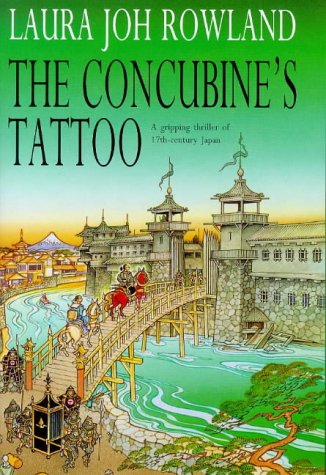This article is a web original
Marco Cian (Hyogo)
The story so far: after a promising first book, followed by a less impressive sequel, the Sano Ichiro series managed to win me back with a third, spectacular entry. With eager enthusiasm I checked out the fourth novel, The Concubine’s Tattoo, hopeful that this upward momentum would continue.
Alas, it was not meant to be. Tattoo is the weakest entry in the series thus far. Not that it’s bad, mind you. Even at this low point it’s still a fun read and a cool mystery. But there’s definitely a lack of polish and subtlety in Tattoo, most notably in its thematic underpinnings. For the past three books, the mysteries have all been tied to a central theme, and Tattoo is no exception. However, Rowland is much more anvilicious with her messaging this time around. With Sano getting married this book, and the murder involving the shogun’s harem, the central theme of Tattoo is that sexism and how we oppress women really sucks, which, hey, I can get behind that message. I think that’s a drum that deserves to be beaten. However, while previous books had these themes expressed through the characters’ actions, with maybe a passage or two near the end where Sano puts things into words, with Tattoo Rowland will show an example of women being oppressed, and then have a character loudly think to themeselves “Gosh! It really sucks how we oppress women like this. Really makes you think, huh? We live in a society…” Of course, I’m not going to police how an oppressed class should express their frustrations with a system that has failed them, but in comparison to previous central themes, Tattoo looks somewhat hamfisted.
This is ultimately only a minor quibble though. I found it noticeable, but not terribly annoying. What I did find annoying was how, despite demonstrating in The Way of the Traitor that she could show a corrupt system without resorting to the banal homosexuality=decadence cliché, Tattoo sees Rowland not only returning to that cliché, but doubling down, by equating homosexuality with pederasty, and going on to attack other, non-heteronormative sexual practices. Without spoiling too much, the killer is involved in a relationship that would be considered abnormal by the standards of our modern society (thought not so much by the standards of Edo period Japan). While the moral I got from the whole experience was “A failure to communicate in a relationship will lead to tragedy”, I couldn’t shake the feeling that Rowland wanted me to think “A relationship that isn’t ‘normal’¹ is doomed and may take out some innocent bystanders before it implodes.” She definitely wants us to regard the murderer with disgust at their deviant practices, though from my perspective, even if their kink is not my kink, I have no real criticism of their proclivities. Sure, they’re kinda weird, but they weren’t hurting anyone (before, obviously, the murder), so I don’t see why Rowland wants us to hate them so much.²
It’s especially irritating because this is the first book where we get a deep dive into the character of Yanagisawa Yoshiyasu, what makes him tick and why he does what he does. In previous books, he was a jealous and catty Depraved Homosexual, but here, we get to spend more time in his head and learn his backstory and motivations. This all culminates in a wonderful scene where Yanagisawa’s schemes to undermine Sano and the shogun’s mother catch up to him, and he can save his own skin, but only by throwing under the bus the only person who truly loves him. It’s a genuinely chilling scene, as we see how Yanagisawa’s cunning and ambition are mixed with cowardice and an intense self-loathing, which make him more than just a boring archetype.
Despite my reservations, I unfortunately am in too deep with the Sano Ichiro series to give up now. Even with Arthur’s Maxim at the back of my mind, I have enough fondness for the characters, the world, and the mysteries that I will probably keep reading until the end. Who knows? Maybe the fifth book will even surprise me like the third one did. Or maybe it will get worse. Who can say?
Marco Cian is a second-year ALT in Hyogo Prefecture. He loves a good mystery, and good character drama, and a whole assortment of other genres. If you’d like to read more of his reviews and recommendations, you can do so at his website here.
[1] Normality, of course, being defined by Rowland.
[2] There’s also a subplot where Rowland takes a dig at “pretty” girls, while presenting her favored female characters as decidedly Not Like Other Girls, which, like, come on now. Let’s not be falling into that trap.





1 thought on “Alright so maybe I spoke too soon…”
Comments are closed.